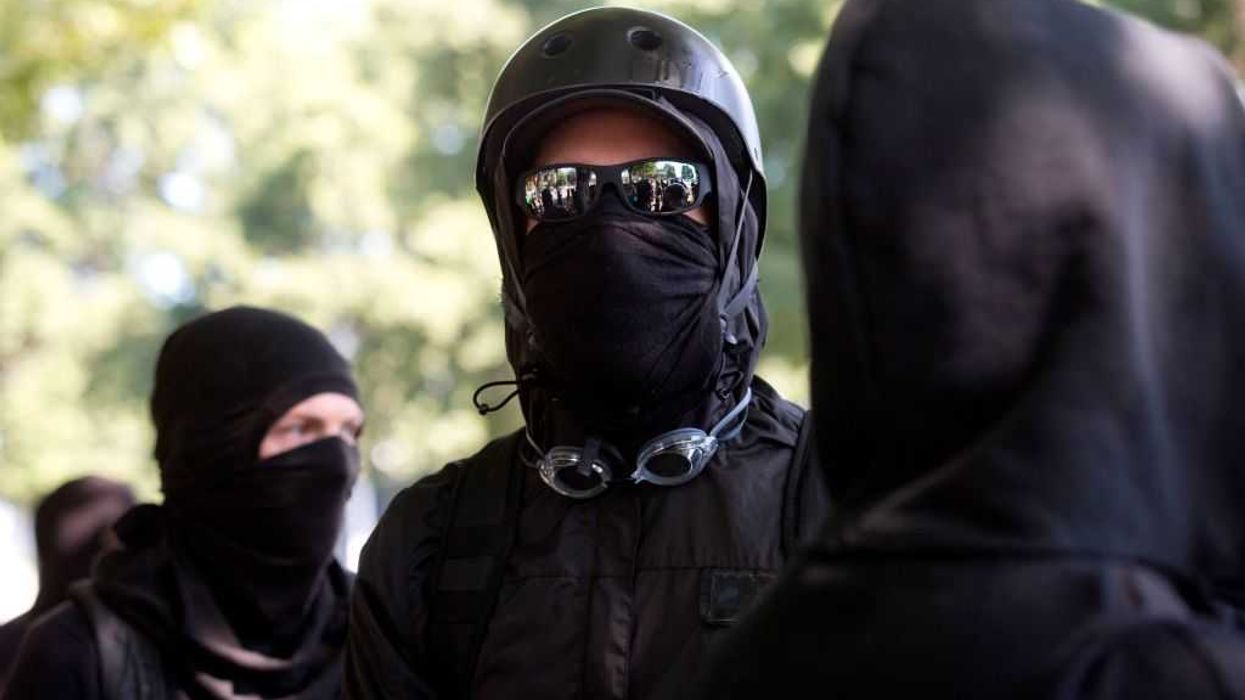Amir Hekmati, a former Marine, has been imprisoned in Iran for over three and a half years, longer than any American citizen held captive by the country. In 2011, he was taken prisoner while visiting his sick grandmother. The Iranian government charged him with "espionage, waging war against God, and corrupting the earth" and sentenced him to die. While the verdict was overturned, he was sentenced during a new secret trial to ten years in prison. Amir and his lawyers didn't know until after the trial took place. Now, veterans like Montel Williams are trying to raise awareness for Amir's plight and see an opportunity for U.S. leaders to take action as the Obama administration looks to improve relations with Iran. Montel joined Glenn on TV to discuss this story.
#FreeAmirNow thanks to @glennbeck @theblaze for covering Amir's case. #Hres233 got to http://t.co/FBEKgcy6We to help this Marine's family
— Montel Williams (@Montel_Williams) May 6, 2015Glenn: I want to talk to you now about really making a difference and reaching out to one another and helping each other and recognizing who’s making a difference. I’m going to introduce you to a man in a second that you know but is truly making a difference, but I want to tell you a story about a US Marine that was arrested in August 2011. He was arrested on allegations of spying for the CIA while he was visiting relatives in Iran. Over the past four years, he has been in an Iranian prison. He has been drugged. He has been whipped. He was told that his mother had died in a car accident, which is not true, and there’s one guy who has been fighting for him and fighting to bring him home. He joins me now. It’s Montel Williams. Hello, Montel.
Montel: Glenn, thank you so much for doing this yet again because one of the things you didn’t just say to your audience is remember, you and I about three weeks before we were able to get Sgt. Tahmooressi out of Mexico, did this same thing, had a conversation with your viewers to say please, we’ve got to make a difference. So, thank you again for having me on tonight.
Glenn: I have an awful lot of respect for you, Montel. The world is really going to hell, and it’s melting down, and history is beginning to repeat itself. You’re one of the few guys that has put differences aside, and you’re looking at bigger principles, and you’re trying to do what Americans have always done, and that is roll up your sleeves and just do the right thing. So, tell me the story about Hekmati.
Montel: You know, this is really crazy. You summarized it well, but let me just see if I can make sure your viewers understand. This is a young man who grew up in Arizona, went to high school in this country, enlisted in the Marine Corps, went and fought with our troops in Iraq and fought with honor, was honorably discharged. Every soldier near him will tell you the bravery he exemplified and who he is as a person.
Now, he went to Iran to visit his grandmother who at the time was extremely ill. He went through the entire process here in the United States. Now, let’s just say this, his parents are of Iranian descent. He was born in the United States. He is an American citizen. He has done everything he can do for our country and decided to serve in the military for the United States to show his support for this country.
So, he had to go to another embassy to get a visa to go to Iran. While he did so, he told them everything about his service, good, trusting, honest Marine that he is. He told them, I was in the Marine Corps. He told them I served in Iraq. They said yeah, come on over, yes, come see your grandmother. Yeah, come on over, it’s fine. Gets there, less than three days later, they arrest him, and they arrest him for spying for the United States.
Now, first off, he’s not an Iranian citizen. They arrest him for being a Marine. They sentenced him to death, Glenn. They held him in a deathwatch for about three or four months, and then in absentia go back into court, overturn a death sentence, and sentence him to ten years in prison for cooperating with a foreign government.
Now, let’s explain this completely. He has been in prison now almost four years. This is close to 1241, 1242 days now that he has been in prison. He has been tortured. Not just drugged, they kept him for about nine months in a three-by-three cell where he couldn’t even move. They have beaten him—three and a half years.
They addicted him to drugs, lithium, and then they take him on and off the addiction to torture him more. About three weeks ago, when the president held the press dinner in DC, he named and mentioned by name one of the other hostages, one that’s being held over, their prisoner being held, and he’s the Washington Post reporter. He mentioned his name. The president has also gone to see another prisoner there, his family, not the prisoner, the family of the minister that’s there. He’s seen him.
No one at this point had reached out to the Marine’s family, Amir Hekmati’s family, from our administration, though we had some underlying people but nobody up above. So, two weeks ago when the president said the other name, they went in and tried to emotionally torture Amir a little bit more, saying look, your country doesn’t care about you. They’re telling everybody else’s name and not yours.
Now, fortunately, last week, I, Amir’s sister, Sarah, and her brother-in-law, went down to DC, and we were able to meet—let me tell you, Glenn, this was unbelievable, because when you hear about what’s going on in Washington, we can’t get politicians to even talk to each other, we met from everybody with everybody from Trey Gowdy to Nancy Pelosi, Kevin McCarthy to Raul Labrador. We went in and literally stood in the Rayburn Room and spoke to every one of them coming in and out.
The Speaker, Speaker Boehner, even retweeted Congressman Kildee, who is the Congressman who is Amir’s Congressman, retweeted his message. So, what’s been going on? Since then, this past weekend, Vice President Biden was in it was Detroit or near where the Hekmatis are from. He was there in town. He went and spent a couple hours with the family and is finally now starting to talk to them. So, our efforts to raise the bar and raise the noise is starting to do something. Now, we need to raise the bar even more, and that’s get Iran to number one, stop even the question of including this Marine and the other hostages in any conversation about any deal.
And because of that, what’s happened is Congressman Kildee and a group of congressmen bipartisan now have put forth House Resolution 233. I’ve got to beg your viewers today to call their congressmen, call their senator, tell them we need to come behind this House bill. We need to let Iran know today that one, this man wore our uniform. There’s no law that he broke by doing so, by being an American citizen. Two, all of us listening right, now believe me, our freedom rides on the back of Marines like Amir to hold back Iran if they attempt to send any weapons anywhere within that region that could be used against us.
We have soldiers, sailors, airmen, Air Force men, Coast Guard men, Marines, that are out there waiting right now to put their lives on the line for us, and their payback will be you wear our uniform, if somebody else arrests you and throws you in jail, we’re not going to do anything to come and get you. We’re going to leave you there to rot. Remember, less than 0.6% of this nation’s population has skin in this game when it comes to a uniform on their back dodging bullets to protect this democracy.
We keep turning our backs on those who have done so, wait and see what happens when the next volley of fire starts to come. So, I’ve got to demand, I’m asking, begging, please, Glenn, thank you so much for giving me an opportunity to say this. If all of your viewers will go up right now #FreeAmirNow, and then you can also #HouseResolution233, and we could raise the ire here and make people understand that the democracy that we are trying to shove down everybody else’s throat needs to have people in uniforms to defend.
Glenn: Okay, I want to see if we can get this trending tonight, and then I’d like to see if I can get you on the radio tomorrow, and we’ll unleash the radio audience as well.
Montel: I’m on. You got me.
Glenn: What this resolution says is basically that Iran is holding three United States citizens. They’ve been held captive for multiple years. They’ve been disappeared, and Rouhani says that the government wishes to engage in construction interaction in the world. Therefore, be it resolved that it is the sense of House representatives that Iran should release all detained United States citizens immediately and provide any information it possesses against United States citizens that have been disappeared within its borders. This is really easy for everybody to get on board with, really easy.
Montel: How can we make it any harder?
Glenn: I know. I want to correct one thing that you said, and it’s possibly the saddest part of your rant. That is you said if we keep deserting them, watch what happens when the next volley comes. I’d like to tell you, and I know you know this to be true, that’s what should happen, but what the people who serve our nation will do is go out anyway and protect us anyway. We are not worthy of their protection.
Montel: You’re right, but I’m talking about the ones that are going to sign up. I should say this, Glenn, you know, recently a study just came back that stated unequivocally our service members are right now at the lowest level of motivation, and they have the lowest opinion of their future in the military. And we let them know every day that I’m going to turn my back on you? Come on.
Glenn: Montel, I have to tell you, I really, truly believe that when history is written about this time period, you will at least be a footnote on what you have done for the military. You are passionate about it, and you are a guy who’s making a difference. This is not your job. And I enjoy having you on because you’re a great example to all of us on what we should be doing.
Montel: Thank you so much, sir.
Glenn: Thank you. We’ll talk to you tomorrow on the radio. Go ahead.
Montel: I’ll catch you on the radio tomorrow, and thank you again, Glenn. Well, last thing, the family needs you to know this is that Amir’s father, two years ago, two and a half years ago, got diagnosed with a brain tumor. The man doesn’t have a lot of time left. This family is paying hospital bills, legal bills. They need some help also, and if I could just please ask and say this, if you want to help the family financially, you can go to giveforward.com/freeAmir. Please, the family needs your help. A couple months ago, you guys were able to raise a lot of money for some other issues. If you could just help them out right now.
You know, we hope we get Amir home in time to see his father before he passes. You know, the thank you to me, let me say this, it’s my honor and my responsibility to the soldiers who follow me and those before me to do this every day, period.
Glenn: I respect the man who believes something so deeply that he weeps when he talks about it. Montel, God bless you. We’ll talk to you tomorrow on the radio.

 AFP Contributor / Contributor | Getty Images
AFP Contributor / Contributor | Getty Images

 Tamir Kalifa / Stringer | Getty Images
Tamir Kalifa / Stringer | Getty Images